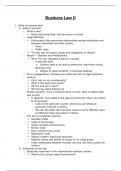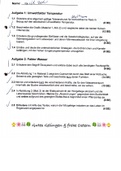Business Law II
1. What is business law?
A. What is the law?
o What is law?
Rules that bring order and structure in society
o Legal definition
Enforceable rules governing relationships among individuals and
between individuals and their society
▫ Taxes
▫ Traffic rules
The law sets out rights, duties and obligations of citizens
o Result = ‘Stability and Predictability’
Why? The law regulates conduct in society
▫ A personal level
♦ Citizens need to be able to determine ‘right from wrong’
▫ Business level
♦ Degree of ‘legal certainty’ in business dealings
o Its no exaggeration: Fortunes are made and lost on legal questions
such as:
Can I rely on my counterparty?
What if this deal turns south?
Will we end up in court?
Will the law stand behind us?
o Simple question: From a business point of view, what is legally right
and wrong?
It depends: how stable is the legal environment where you intend
to do business
▫ Look to the particular country where you are sitting at
particular moment in history
▫ The law has dealt with business issues in verry different ways
at different times and places in history
o The law is constantly evolving
Nomadic tribes
Code of Hammurabi
Greek concepts of Democracy
Roman Code
Early Common law courts
Napoleonic Code
Today’s modern laws/court decisions
® Reflects values and beliefs of society or its ruling group
® Close relationship between morality and any rule that society will
enforce
B. Influences on the law
o Especially important in the international business context
What is the current Legal Environment?
, Society’s current attitudes?
Can the law be ‘behind the times’?
Noteworthy trends?
o Your role in business: key questions for international business persons
How will the local, legal environment affect my business decision
making?
▫ Degree of predictability?
▫ Business implications?
▫ Many different laws can affect a single business decision
Key questions for international business persons
▫ Sales
▫ Intellectual Property
▫ Mergers & acquisitions
▫ Agency
▫ Product liability
▫ Banking
▫ Competition
▫ Employment
▫ Contracts
▫ Business organisation
▫ Corporate fraud
▫ Bankruptcy
C. International private law
o Set of rules or procedural law that regulates relationships between
persons (or entities) of different nationalities
o Determines which legal system and law of which jurisdiction will apply
to a legal dispute among individuals involving a foreign element
o Also known as ‘Conflict of laws’
D. International law
o Transnational rules that national courts use to regulate three primary
relaitoinships:
Relationship between two nations
Relationship between a nation and an individual
Relationship between persons/entities from different countries
o Sources
Int’l conventions & treaties, customs/general practice
Widely accepted general principles of law
All other sources used in national law (such as judicial decisions &
scholarly writings)
E. Civil vs. Common Law
o Civil law: ‘Continental European Approach’
Oldest & most influential legal system
Roman-Germanic: codified law based on Roman Code
Legal rules set out in one comprehensive & systemized code and
accompanying statuses
▫ Family law
, ▫ Property law
▫ Succession law
▫ Law of obligations
▫ Commercial law
▫ Labor law
▫ Criminal law
▫ …
Each law has it’s own code
More black and white
o Common Law: ‘Anglo-Saxon Tradition’
Law is found on a ‘case-by-case basis’
Law is based on court decisions rather than formal codes:
‘precedent’
Overall accumulation of judicial decisions – law is developed and
pronounced by courts
Stare decisis (stand by the decision): requires courts to follow
their own precedents, binds all of the lower courts of a jurisdiction
to determinations of the highest court in that same jurisdiction
In common law, the judges make the rules
2. Contracts
A. Intro: what is a contract?
o When was the last time you entered a contract?
Borrow money from bank
Enroll in a healthclub
Employment contract
Rental contract
Signed up for phone plan
Credit card
Purchased a car
Marriage
Metro/bus ticket
Sandwich & drink
…
a. Definition
Promise or agreement
Creates legal obligation to do or not to do particular thing
Each party enjoys a ‘right’ but also has a burden to perform a
‘duty’
‘legally binding agreement between two or more parties,
enforceable in a court of law’
b. Legal definition
A contract is formed by a meeting of the minds of at least two
parties, a mutual assent resulting from the expression of an offer
by the one and an acceptance of precisely that offer by the other
…
c. Benefits to society
‘the law sets out rights, duties and obligations, …’
, Contract = lawful expectations met + remedies enforced
Essential to legal system: trust, predictability & consistency
Modern business could not exist without contracts
Basis of all commercial dealings:
▫ ‘enforceable agreements’ as voluntarily agreed upon between
individuals
d. Proof of existence
You must be able to prove a contract exists
Q: are all legally required elements present within the terms of
this agreement?
▫ Four essential elements
♦ Capacity of parties
♦ Mutual agreement
♦ Consideration
◊ Qid pro quo
◊ Something for something
♦ Legality of contract
Q: must a contract always be in writing to be legally enforced?
Express vs implied contracts
▫ Express: a written or oral statements
♦ An agreement that is expressed in written or oral words,
terms are generally ‘clear & definite’
▫ Implied: manifested by conduct rather than express language
♦ A contract in which agreement between parties has been
inferred from their conduct
▫ Q: Can I be held to something that I did not agree to?
♦ Implied-in-fact contracts
♦ Implied-in-law
e. Agreement
Meeting of minds
▫ Offer + acceptance
The offer
▫ Promise/ commitment communicated by offeror to offeree
▫ To perform or refrain from performing some specific act in the
future
▫ Manifestation of willingness to enter into a legally binding
agreement
▫ Offeror:
♦ Person who makes an offer
▫ Offeree:
♦ Person to whom the offer is made
1. What is business law?
A. What is the law?
o What is law?
Rules that bring order and structure in society
o Legal definition
Enforceable rules governing relationships among individuals and
between individuals and their society
▫ Taxes
▫ Traffic rules
The law sets out rights, duties and obligations of citizens
o Result = ‘Stability and Predictability’
Why? The law regulates conduct in society
▫ A personal level
♦ Citizens need to be able to determine ‘right from wrong’
▫ Business level
♦ Degree of ‘legal certainty’ in business dealings
o Its no exaggeration: Fortunes are made and lost on legal questions
such as:
Can I rely on my counterparty?
What if this deal turns south?
Will we end up in court?
Will the law stand behind us?
o Simple question: From a business point of view, what is legally right
and wrong?
It depends: how stable is the legal environment where you intend
to do business
▫ Look to the particular country where you are sitting at
particular moment in history
▫ The law has dealt with business issues in verry different ways
at different times and places in history
o The law is constantly evolving
Nomadic tribes
Code of Hammurabi
Greek concepts of Democracy
Roman Code
Early Common law courts
Napoleonic Code
Today’s modern laws/court decisions
® Reflects values and beliefs of society or its ruling group
® Close relationship between morality and any rule that society will
enforce
B. Influences on the law
o Especially important in the international business context
What is the current Legal Environment?
, Society’s current attitudes?
Can the law be ‘behind the times’?
Noteworthy trends?
o Your role in business: key questions for international business persons
How will the local, legal environment affect my business decision
making?
▫ Degree of predictability?
▫ Business implications?
▫ Many different laws can affect a single business decision
Key questions for international business persons
▫ Sales
▫ Intellectual Property
▫ Mergers & acquisitions
▫ Agency
▫ Product liability
▫ Banking
▫ Competition
▫ Employment
▫ Contracts
▫ Business organisation
▫ Corporate fraud
▫ Bankruptcy
C. International private law
o Set of rules or procedural law that regulates relationships between
persons (or entities) of different nationalities
o Determines which legal system and law of which jurisdiction will apply
to a legal dispute among individuals involving a foreign element
o Also known as ‘Conflict of laws’
D. International law
o Transnational rules that national courts use to regulate three primary
relaitoinships:
Relationship between two nations
Relationship between a nation and an individual
Relationship between persons/entities from different countries
o Sources
Int’l conventions & treaties, customs/general practice
Widely accepted general principles of law
All other sources used in national law (such as judicial decisions &
scholarly writings)
E. Civil vs. Common Law
o Civil law: ‘Continental European Approach’
Oldest & most influential legal system
Roman-Germanic: codified law based on Roman Code
Legal rules set out in one comprehensive & systemized code and
accompanying statuses
▫ Family law
, ▫ Property law
▫ Succession law
▫ Law of obligations
▫ Commercial law
▫ Labor law
▫ Criminal law
▫ …
Each law has it’s own code
More black and white
o Common Law: ‘Anglo-Saxon Tradition’
Law is found on a ‘case-by-case basis’
Law is based on court decisions rather than formal codes:
‘precedent’
Overall accumulation of judicial decisions – law is developed and
pronounced by courts
Stare decisis (stand by the decision): requires courts to follow
their own precedents, binds all of the lower courts of a jurisdiction
to determinations of the highest court in that same jurisdiction
In common law, the judges make the rules
2. Contracts
A. Intro: what is a contract?
o When was the last time you entered a contract?
Borrow money from bank
Enroll in a healthclub
Employment contract
Rental contract
Signed up for phone plan
Credit card
Purchased a car
Marriage
Metro/bus ticket
Sandwich & drink
…
a. Definition
Promise or agreement
Creates legal obligation to do or not to do particular thing
Each party enjoys a ‘right’ but also has a burden to perform a
‘duty’
‘legally binding agreement between two or more parties,
enforceable in a court of law’
b. Legal definition
A contract is formed by a meeting of the minds of at least two
parties, a mutual assent resulting from the expression of an offer
by the one and an acceptance of precisely that offer by the other
…
c. Benefits to society
‘the law sets out rights, duties and obligations, …’
, Contract = lawful expectations met + remedies enforced
Essential to legal system: trust, predictability & consistency
Modern business could not exist without contracts
Basis of all commercial dealings:
▫ ‘enforceable agreements’ as voluntarily agreed upon between
individuals
d. Proof of existence
You must be able to prove a contract exists
Q: are all legally required elements present within the terms of
this agreement?
▫ Four essential elements
♦ Capacity of parties
♦ Mutual agreement
♦ Consideration
◊ Qid pro quo
◊ Something for something
♦ Legality of contract
Q: must a contract always be in writing to be legally enforced?
Express vs implied contracts
▫ Express: a written or oral statements
♦ An agreement that is expressed in written or oral words,
terms are generally ‘clear & definite’
▫ Implied: manifested by conduct rather than express language
♦ A contract in which agreement between parties has been
inferred from their conduct
▫ Q: Can I be held to something that I did not agree to?
♦ Implied-in-fact contracts
♦ Implied-in-law
e. Agreement
Meeting of minds
▫ Offer + acceptance
The offer
▫ Promise/ commitment communicated by offeror to offeree
▫ To perform or refrain from performing some specific act in the
future
▫ Manifestation of willingness to enter into a legally binding
agreement
▫ Offeror:
♦ Person who makes an offer
▫ Offeree:
♦ Person to whom the offer is made












